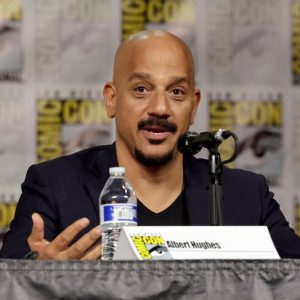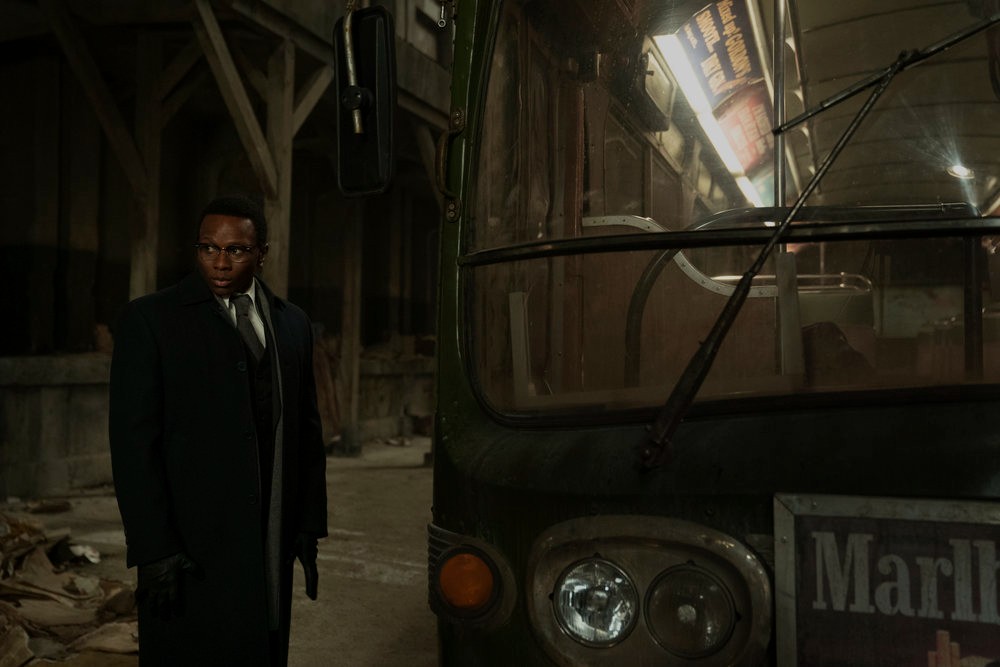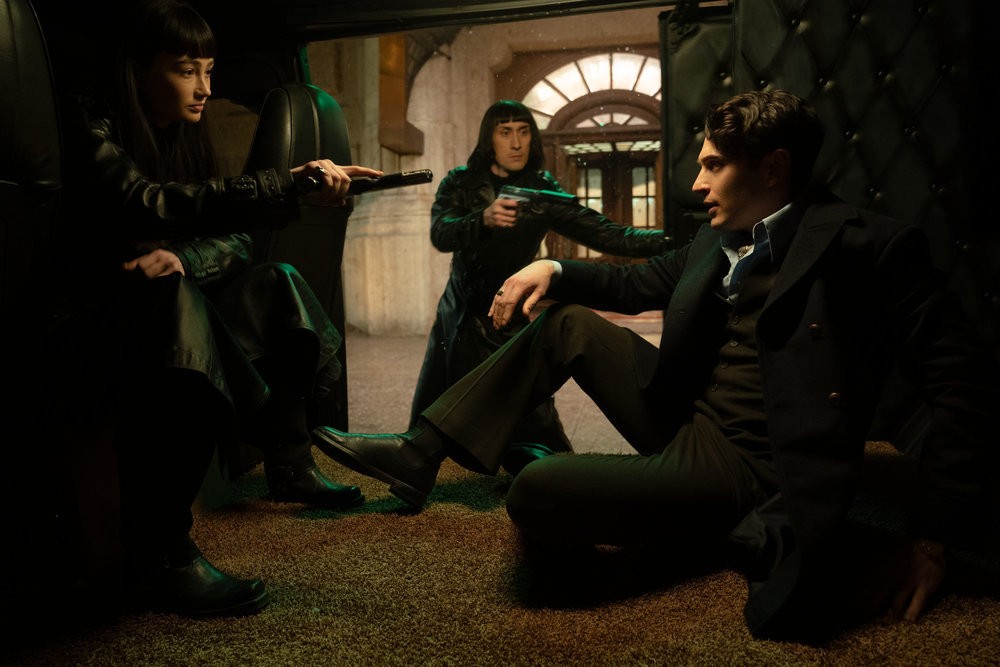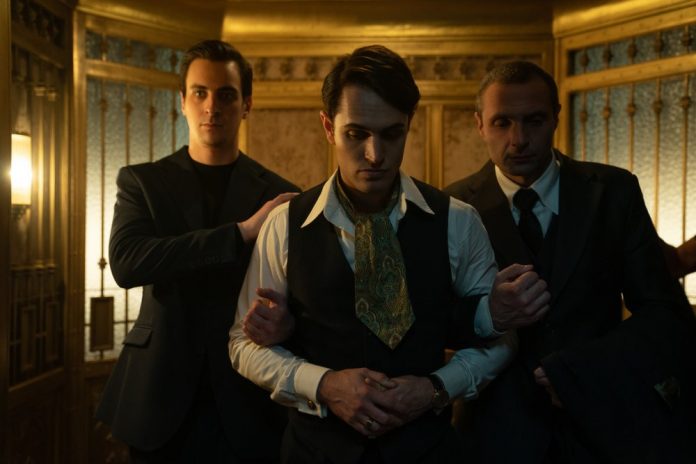Twin directors Albert and Allen Hughes celebrate 30 years in showbiz this year, having burst onto the Hollywood scene with their 1993 film Menace II Society. Together, they directed Dead Presidents., the Johnny Depp thriller From Hell, and the Denzel Washington movie The Book of Eli, which was their last collaboration. Since then, the Hughes brothers have pursued their own separate projects, with Allen directing the Mark Wahlberg–Russell Crowe thriller Broken City and HBO’s acclaimed docuseries The Defiant Ones.
Albert, on the other hand, directed the survival film Alpha and Showtime’s limited series The Good Lord Bird starring Ethan Hawke, and he returns behind the camera with a vengeance, having directed two of the 90-minute episodes from Peacock’s new John Wick prequel series The Continental: From the World of John Wick, which follows the early years of Winston Scott — Ian McShane‘s character in the movies — before he became the manager of the titular assassin-friendly hotel.
Set in the ’70s, The Continental takes place in New York and London, where we see the younger Winston (Colin Woodell) countering the criminal behavior of his brother, Frankie (Ben Robson), under the watchful eye of crime boss Cormac (Mel Gibson).
The event series is only Hughes’ second foray into the world of television after directing an episode of The Good Lord Bird, and though The Continental certainly shares some of the same DNA as the John Wick movies, it also exists as its own thing with its own style, and it harkens back to the gritty violence and catchy needle drops that defined some of Hughes’ early work.
Above the Line recently spoke with Albert Hughes over Zoom, and the director revealed why he took on this ambitious streaming series despite his normal reticence towards the way television works, from a directing standpoint.

Above the Line: The last time we spoke was with your brother for The Book of Eli at ComiCon. I remember that footage had a scene that was probably inspired by Oldboy. Later that night, I was talking to Park Chan-wook at a party for his movie, and mentioned that scene, and I was impressed that he was well aware of you and your brother’s movies and name-dropped Dead Presidents and Menace II Society.
Albert Hughes: That’s the first time I’m hearing that, and it’s interesting because there’s like a snake eating its tail or a meta moment. You meet other filmmakers and either through osmosis or indirectly or directly, you all kind of influenced each other. I remember my brother, I think, brought up that sequence from Old Boy. It was an inspiration of ‘Hey, can you pull up something in one shot, showing it all?’ Back then it was all that Paul Greengrass handheld cut-y stuff, right? I use the inspiration of seeing it for the underpass silhouette bit with Denzel [Washington] fighting those guys.
ATL: So let’s talk about The Continental and how you got into the world of John Wick. It’s an interesting project because you have three 90-minute movies, sort of, with Charlotte Brändström directing the middle episode. Did Basil Iwanyk approach you to direct it or who got you interested in directing two of the episodes?
Hughes: I kind of got Jedi mind tricked by my agent, who told me about it. At face value, I probably had the same reaction that the fan base had. ‘They’re going to supposedly make a TV show, why would they want to do that?’ They were like, ‘Just get on a Zoom call and hear them out. Let them pitch you the show.’ I’ve known Basil for years, beginning at Warner Brothers, and Erica [Lee]. We get on a Zoom and halfway through the Zoom, Erica says to me, ‘We’re so happy you want to do it.’ I was like, ‘Fuck, my agent, I don’t know what’s going on here.’ Right? So I played along, and then, I said, ‘Basil, what is it you want me to Do? Do you want me to do the pilot? You want me to do all three of them?’ ‘We’re hoping you’ll do all three.’ I just took this large gulp like, ‘Oh my God.’
At that point, I don’t think I knew the way they laid out the shooting schedule from the studio, and it was such a healthy thing to have four weeks of prep before the last two episodes, let’s say 14 weeks prep for the first episode overall, and if you’re the supervising director, you have to handle a lot of business on two, as well, right? I sat down and went, ‘This is very odd for a studio to do this, because they’re trying to ensure quality with this schedule.’ For traditional TV, you’re rolling into the next guest director and there’s no let up, there’s no prep. So I’m like, ‘This is interesting.’ I read it before I got on with him, and I said, ‘Oh, this takes place in the ’70s.’ And then I’m like, ‘Do I want to play in another man or woman’s sandbox?’
Along with my brother, we have our own careers, and we’re not trying to do that. And then I started thinking about guys like Jon Favreau on The Mandalorian and Tony Gilroy Andor and Noah Hawley and Fargo, and I go, ‘Well, they did it quite successfully. How did that work? Oh, they kept the world, the universe, the tone, but they went right with it. They brought what they specialize in. Basil and Erica and Chad [Stahelski] in particular, were very supportive of like, ‘No, we want this filmmaker driven, it’s not traditional TV. We want you to bring with you’re inspired by.’
Chad told me his inspirations, like Bob Fosse musical dance numbers, Hong Kong cinema, and the ballet of bullets that he makes out of that inspiration. And then he posed to me, ‘What are your things?’ I had to go think about it. One was the musical side of it, the needle drops from the ’70s. The other was the reverse-engineering of something that already exists in the fact that it’s in the 70s, which means it has inherently a different style. What is my tone? Even though I’ve done serious films that are set in inner cities and violence and traumas, there’s always a little humor. Chad and Keanu [Reeves] have humor, but it’s more physical humor. The show leans more on verbal humor, and a bit of a musical humor. Those are the differences, but that was the challenge and it was fun, and I never expected that I would have so much fun and feel so liberated. It was liberating to do it. It wasn’t constricting.

ATL: Did you get to use Chad’s stunt team? Was the show being made in parallel with him making John Wick 4, or had he already finished shooting it?
Hughes: He was finishing the backside of his schedule, and we started shooting. I think they may have wrapped when we started shooting. They have a bunch of teams within 8711 that they send off to do different movies, and he blessed Larnell Stovall, our action coordinator and [second unit director] and the guys that he had. Everybody asked me about the action. ‘Was there pressure?’ No, there’s no pressure because it’s the same team of guys, and they’re really, really good at what they do, and they really take great care in that area. They know the audience they’re servicing, and your job is to work with them and say, ‘I don’t like that. That’s too long. Can you add a little bit more humor here? I like Jackie Chan, I like Buster Keaton. Let’s get into some more of that kind of stuff.’ They’re just wonderful at the use of space creatively.
ATL: With them, you also know you don’t have to rely on editing to piece something together to make the action work, and you can do things in one shot if you want.
Hughes: Exactly.
ATL: Were you involved early enough to be involved with the casting and every aspect of it, hiring the below-the-line heads, the DP, etc.?
Hughes: Oh, yeah. There’s no way as a filmmaker… that’s why I would never really fit into traditional TV as a director for hire. You can see by the catalog. If you look at the years me and my brother worked, there are big gaps. It’s because if we can’t control… we consider there’s a difference between a filmmaker and a director. A director, you can just hire to do anything. Go, ‘Action, cut!’ may not even be around for the editing in TV. There’s a very personal thing with my brother and I. We don’t know anything else; we’ve done it since we were 12, so to expect me to walk away from something that I’ve captured or to join something that’s already been cast and you’ve hired crew on means you’re affecting my tool set? I didn’t pick my paintbrushes, so how am I gonna make the painting come from me? So it’s a weird thing.
They were great. I gotta say, Lionsgate TV, Peacock, the producers, they stood by what they said. Sometimes they sell you a line of bullshit, and you find out halfway through this is a bad situation. No, they stood by what they said.
ATL: Did you have a different DP between your two episodes? I think I saw that one DP did the first two nights, and then another one shot the third.
Hughes: It was interesting. The DP that did Episode 3 is [David] Lynch‘s DP that I found years ago after he did Lost Highway, Peter Deming, who I’m seeing tonight, by the way. I’ve worked with him for years. He shot From Hell for me, shot a bunch of other things for me, and [he’s] a friend of mine. He got offered the whole show first. He has a 16-year-old daughter, who is in high school in New York, and yada yada yada.
Then I find this young talented kid from Norway, Pål Rokseth is his name. It was wonderful working with a guy who’s younger than me. I’ve never worked with a DP younger than me, I mean, that’s how old I’m getting. My DP’s 36 years old! I live in Europe, and I watch a lot of European movies and there’s a certain flavor I like in their cinematography, a certainly artistic rendering they do that the Americans just don’t do. Pål is kind of like this artistic butterflies, he’s bouncing around and creating these things, and he’s taking my style and putting a European twist on it that I’m already turned on by. His wife is a filmmaker, so he couldn’t do all three, and I found out late and I was heartbroken, because I found out during the middle of Episode 2, and I was really like devastated by it.
I called up Peter again, like, ‘Hey, Peter, are you sure you can’t do three?’ ‘Yeah, I think I can.’ Peter brought back the familiarity and the comfort level and shorthand, where you don’t have to talk too much. He’s seen it all, he’s an old pro. At that point, we needed the stability for Three, because it was nonstop, that episode. It was wild, and if you do one thing wrong in scheduling or shooting, it’s gonna go all the hell. I needed a sage guy, and it just happened it worked out that way.

ATL: Night One looks amazing, and I’m embarrassed to have watched it on my laptop, since I’m sure it would look amazing on the big screen, too.
Hughes: I just saw it at the Chinese Theatre, this huge screen, and it’s a completely different experience, but I shoot for big screens anyways. I’m not capable of thinking about the small. So have you seen Three?
ATL: I haven’t watched Episode 3 yet, but I also saw a huge list of spoilers for it, so I wasn’t even sure we could get into any of that.
Hughes: Three is wild.
ATL: How did you work with Charlotte with her directing the second installment? What was the overlap like, and were you doing post on your first episode while she was shooting? How did that work out between you two?
Hughes: Charlotte Brändström was her name, I think she’s Swedish and French. It’s an interesting thing in TV when you don’t have the prep and the directors are shuffling in, he guest directors what-not. I’ve only had one experience like that. I think it’s a healthy problem of quality-controlling the tone in style that everybody talks about in TV, but TV is more of a writers’ medium, so most TV shows don’t have a style. They might have a tone with the actor and story. Creating a style guide and making sure that she’s sticking to it, and she’s understanding what’s going on. She’s been around forever, she’s an old pro. There are gonna be bumps with anybody trying to fit into that system, whether it’s [Martin] Scorsese or David Lean.
You drop any director into a middle episode, there’s a creative ebb and flow. But we had the same crew and cast, so we were able to use that episode also as a point of ‘What do we need to do on [Epsiode] 3 to be better?’ We learned our lessons from One, now we’re learning our lessons from [Episode] 2. It was a really interesting thing, and I’m so happy I got this experience, because it’s almost like you can clean things up from episodes while you’re shooting another episode, and that’s what TV is great for. And then I had to finish everything with Kirk Ward, the showrunner and writer, who was my partner in crime. Once all the episodes settle, I have to do the VFX, I have to do the needle drops, I have to do the edit. I have to mix them, color them. That’s kind of cool, because now you have the final stages of making sure the quality control is right.
ATL: I have to ask about working with Mel Gibson. He’s obviously a great actor, a pro who can come in and knock out his scenes pretty quickly. But he’s also an Oscar-winning filmmaker who has directed all these amazing movies. As a director yourself, did you have a chance to ask him questions about the movies he’s made?
Hughes: That’s all we did, and he’s great. He’s very egalitarian. He talks to everybody: P.A.s, extras, everything, because he’s a filmmaker, so you can connect with a filmmaker about filmmaking, but he’s very sly, because he feigns naïveness, and he knows everything that’s going on.
ATL: So he puts on different hats and in this case, can just wear his actor’s hat?
Hughes: I would say the most fascinating thing I saw is that… I’ve seen some actors do this before, but not at this level. He knows his edit in and his edit out. He may clean up the rest of his take in the second take, and he’s dying and flopping all over the place but edit in, edit out… he’s blocking how to put it together from the filmmaker’s side of him, and it’s just fascinating to watch. I’ve seen Denzel [Washington] do similar things. I’ve seen Gary Oldman, give 100 percent every goddamn minute of every take. Gary Oldman doesn’t have a 50 percent or a 75 percent.
The Continental: From the World of John Wick will air its first episode (aka Night One) on Peacock on Sept. 22, followed by the following two nights airing on Sept. 29 and Oct. 6.



